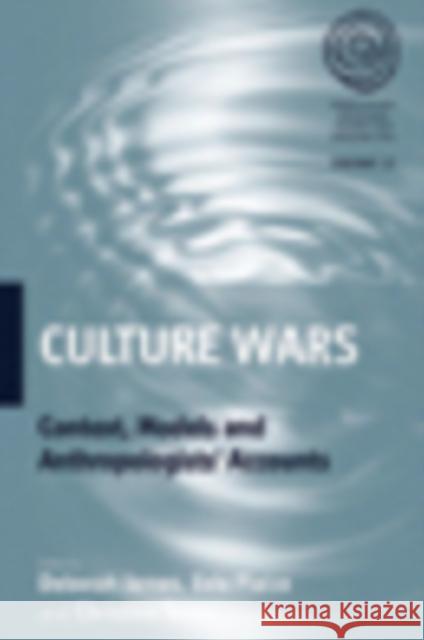Culture Wars: Context, Models and Anthropologists' Accounts » książka
Culture Wars: Context, Models and Anthropologists' Accounts
ISBN-13: 9781845456412 / Angielski / Twarda / 2010 / 230 str.
Culture Wars: Context, Models and Anthropologists' Accounts
ISBN-13: 9781845456412 / Angielski / Twarda / 2010 / 230 str.
(netto: 493,01 VAT: 5%)
Najniższa cena z 30 dni: 498,70
ok. 30 dni roboczych.
Darmowa dostawa!
The relationship between anthropologists' ethnographic investigations and the lived social worlds in which these originate is a fundamental issue for anthropology. Where some claim that only native voices may offer authentic accounts of culture and hence that ethnographers are only ever interpreters of it, others point out that anthropologists are, themselves, implanted within specific cultural contexts which generate particular kinds of theoretical discussions. The contributors to this volume reject the premise that ethnographer and informant occupy different and incommensurable "cultural worlds." Instead they investigate the relationship between culture, context, and anthropologists' models and accounts in new ways. In doing so, they offer fresh insights into this key area of anthropological research. Deborah James is Professor of Anthropology at the London School of Economics. Her research interests, focused on South Africa, include migration, ethnomusicology, ethnicity, property relations and the politics of land reform. She is author of Songs of the Women Migrants: Performance and Identity in South Africa (Edinburgh University Press, 1999) and of Gaining Ground? "Rights" and "Property" in South African Land Reform (Routledge, 2007). Evelyn Plaice is Associate Professor of Anthropology jointly appointed to the Faculty of Arts and the Faculty of Education at the University of New Brunswick, Canada. Her interests include land, identity and the ethnopolitics of land restitution, and the anthropology of education. She has conducted research in both South Africa and Canada and is the author of .The Native Game: Indian-Settler Relations in Central Labrador (ISER, 1990). Christina Toren is Professor of Social Anthropology at the University of St Andrews. Her fieldwork areas are Fiji and the Pacific, and Melanesia, and her theoretical interests include exchange processes; spatio-temporality as a dimension of human being; sociality, kinship and ideas of the person; the analysis of ritual; epistemology; ontogeny as a historical process. Her books include Making Sense of Hierarchy: cognition as social process in Fiji (Athlone, 1990) and Mind, Materiality and History: Explorations in Fijian Ethnography (Routledge, 1999).
The relationship between anthropologists ethnographic investigations and the lived social worlds in which these originate is a fundamental issue for anthropology. Where some claim that only native voices may offer authentic accounts of culture and hence that ethnographers are only ever interpreters of it, others point out that anthropologists are, themselves, implanted within specific cultural contexts which generate particular kinds of theoretical discussions. The contributors to this volume reject the premise that ethnographer and informant occupy different and incommensurable "cultural worlds." Instead they investigate the relationship between culture, context, and anthropologists models and accounts in new ways. In doing so, they offer fresh insights into this key area of anthropological research.Deborah James is Professor of Anthropology at the London School of Economics. Her research interests, focused on South Africa, include migration, ethnomusicology, ethnicity, property relations and the politics of land reform. She is author of Songs of the Women Migrants: Performance and Identity in South Africa (Edinburgh University Press, 1999) and of Gaining Ground? "Rights" and "Property" in South African Land Reform (Routledge, 2007).Evelyn Plaice is Associate Professor of Anthropology jointly appointed to the Faculty of Arts and the Faculty of Education at the University of New Brunswick, Canada. Her interests include land, identity and the ethnopolitics of land restitution, and the anthropology of education. She has conducted research in both South Africa and Canada and is the author of .The Native Game: Indian-Settler Relations in Central Labrador (ISER, 1990).Christina Toren is Professor of Social Anthropology at the University of St Andrews. Her fieldwork areas are Fiji and the Pacific, and Melanesia, and her theoretical interests include exchange processes; spatio-temporality as a dimension of human being; sociality, kinship and ideas of the person; the analysis of ritual; epistemology; ontogeny as a historical process. Her books include Making Sense of Hierarchy: cognition as social process in Fiji (Athlone, 1990) and Mind, Materiality and History: Explorations in Fijian Ethnography (Routledge, 1999).











